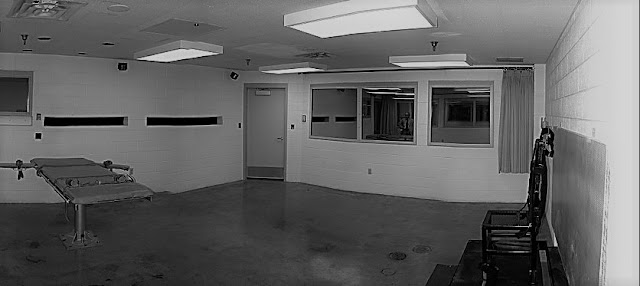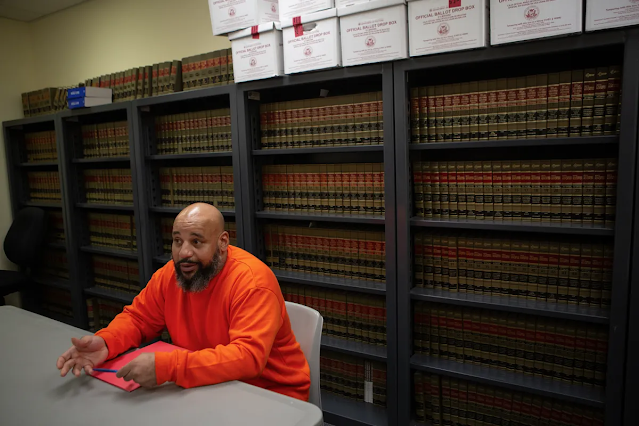By Amanda Hernandez
Violent crime and property crime in the United States dropped in 2023, continuing a downward trend following higher rates of crime during the pandemic, according to the FBI’s latest national crime report.
Murders and intentional manslaughter, known as non-negligent manslaughter, fell by 11.6% from 2022. Property crime dropped by 2.4%.
Overall, FBI data shows that violent crime fell by 3%.
Violent crime has become a major issue in the 2024 presidential race, with former President Donald Trump claiming that crime has been “through the roof” under the Biden administration.
On the campaign trail, Trump, the Republican presidential nominee, has cited findings from a different source — the U.S. Bureau of Justice Statistics’ National Crime Victimization Survey — to argue that crime is out of control.
While the FBI’s data reflects only crimes reported to the police, the victimization survey is based on interviews conducted by the U.S. Census Bureau and includes both reported and unreported crimes. Interviewees are asked whether they reported the crime to the police. But the survey does not include murder data and only tracks crimes against individuals aged 12 and older.
The victimization survey, released in mid-September, shows that the violent crime victimization rate rose from 16.4 per 1,000 people in 2020 to 22.5 per 1,000 in 2023. The report also notes that the 2023 rate is statistically similar to the rate in 2019, when Trump was in office.
Many crime data experts consider both sources trustworthy. But the agencies track different trends, measure crimes differently and collect data over varying time frames. Unlike the victimization survey, the FBI’s data is largely based on calls for service or police reports. Still, most crimes go unreported, which means the FBI’s data is neither entirely accurate nor complete.
The victimization surveys released throughout the peak years of the pandemic were particularly difficult to conduct, which is a key reason why, according to some experts, the FBI and the survey may show different trends.
As a result, these differences, which are often unknown or misunderstood, make it easier for anyone — including politicians — to manipulate findings to support their agendas.
Political candidates at the national, state and local levels on both sides of the aisle have used crime statistics in their campaigns this year, with some taking credit for promising trends and others using different numbers to flog their opponents. But it’s difficult to draw definitive conclusions about crime trends or attribute them to specific policies.
“There’s never any single reason why crime trends move one way or another,” said Ames Grawert, a crime data expert and senior counsel for the Brennan Center for Justice’s justice program. The Brennan Center is a left-leaning law and policy group.
“When an answer is presented that maybe makes intuitive sense or a certain political persuasion, it’s all too natural to jump to that answer. The problem is that that is just not how crime works,” Grawert told Stateline.
At an August rally in Philadelphia, the Democratic vice presidential candidate, Minnesota Gov. Tim Walz, said: “Violent crime was up under Donald Trump. That’s not even counting the crimes he committed.”
During Trump’s first three years in office, the violent crime rate per 100,000 people actually decreased each year, according to the FBI, from 376.5 in 2017, to 370.8 in 2018, to 364.4 in 2019.
It wasn’t until 2020 that the rate surged to 386.3, the highest under Trump, which is when the country experienced the largest one-year increase in murders.
We live in a world of sound bites, and people aren't taking the time to digest information and fact check. The onus is on the voter.
– Alex Piquero, criminology professor at the University of Miami and former director of the federal Bureau of Justice Statistics
Walz’s comments overlook the impact of the COVID-19 pandemic and the social upheaval following George Floyd’s murder by a Minneapolis police officer in 2020. And despite the increase that year, the violent crime rate in Trump’s final year remained slightly lower than in the last year of President Barack Obama’s administration. In 2016, the rate was 386.8 per 100,000 people.
Following the release of the FBI’s annual crime report last month, U.S. Rep. Dan Bishop, a Republican running for attorney general in North Carolina, shared and later deleted a retweet on X that falsely claimed the FBI’s data showed zero homicides in Los Angeles and New Orleans last year. In fact, FBI data showed that the Los Angeles Police Department reported 325 homicides, while New Orleans police reported 198 in 2023.
Voters worry
Crime has emerged as a top issue on voters’ minds.
A Gallup poll conducted in March found that nearly 80% of Americans worry about crime and violence “a great deal” or “a fair amount,” ranking it above concerns such as the economy and illegal immigration. In another Gallup poll conducted late last year, 63% of respondents described crime in the U.S. as either extremely or very serious — the highest percentage since Gallup began asking the question in 2000.
Crime data usually lags by at least a year, depending on the agency or organization gathering and analyzing the statistics. But the lack of accurate, real-time crime data from official sources, such as federal or state agencies, may leave some voters vulnerable to political manipulation, according to some crime and voter behavior experts.
There are at least three trackers collecting and analyzing national and local crime data that aim to close the gap in real-time reporting. Developed by the Council on Criminal Justice, data consulting firm AH Datalytics and NORC at the University of Chicago, these trackers all show a similar trend of declining crime rates.
“We live in a world of sound bites, and people aren’t taking the time to digest information and fact check,” Alex Piquero, a criminology professor at the University of Miami and former director of the federal Bureau of Justice Statistics, said in an interview with Stateline. “The onus is on the voter.”
Crime trends and limitations
In 2020, when shutdowns in the first year of the COVID-19 pandemic kept people at home, homicides surged by nearly 30% — the largest single-year increase since the FBI began tracking crime.
In 2022, violent crime had fallen back to near pre-pandemic levels, and the FBI data showed a continued decline last year. The rate of violent crime dropped from about 377 incidents per 100,000 people in 2022, to around 364 per 100,000 in 2023, slightly below the 2019 rate.
The largest cities, those with populations of at least 1 million, saw the biggest drop in violent crime — nearly 7% — while cities with populations between 250,000 and 500,000 saw a slight 0.3% increase.
Rape incidents decreased by more than 9% and aggravated assault by nearly 3%. Burglary and larceny-theft decreased by 8% and 4%, respectively.
Motor vehicle theft, however, rose by 12% in 2023 compared with 2022, the highest rate of car theft since 2007, with 319 thefts per 100,000 people.
Although national data suggests an overall major decrease in crime across the country, some crime-data experts caution that that isn’t necessarily the case in individual cities and neighborhoods.
“It can be sort of simplistic to look at national trends. You have to allow the space for nuance and context about what’s happening at the local level too,” said Grawert, of the Brennan Center.
Some crime experts and politicians have criticized the FBI’s latest report, pointing out that not all law enforcement agencies have submitted their crime statistics.
The FBI is transitioning participating agencies to a new reporting system called the National Incident-Based Reporting System or NIBRS. The FBI mandated that the transition, which began in the late 1980s, be completed by 2021. This requirement resulted in a significant drop in agency participation for that year’s report because some law enforcement agencies couldn’t meet the deadline.
In 2022, the FBI relaxed the requirement, allowing agencies to use both the new and older reporting systems. Since the 2021 mandate, more law enforcement agencies have transitioned to the new reporting system.
Reporting crime data to the FBI is voluntary, and some departments may submit only a few months’ worth of data.
Although the FBI’s latest report covers 94% of the U.S. population, only 73% of all law enforcement agencies participated, using either reporting system, according to Stateline’s analysis of the FBI’s Uniform Crime Reporting program participation data. This means that 5,926 agencies, or 27%, did not report any data to the FBI.
The majority of the missing agencies are likely smaller rural departments that don’t participate due to limited resources and staff, according to some crime data experts.
But participation in the FBI’s crime reporting program has steadily increased over time, particularly after the drop in 2021. Many of the law enforcement agencies in the country’s largest cities submitted data for 2023, and every city agency serving a population of 1 million or more provided a full year of data, according to the FBI’s report.
This article originally appeared in Stateline October 7th, 2024








.png)










